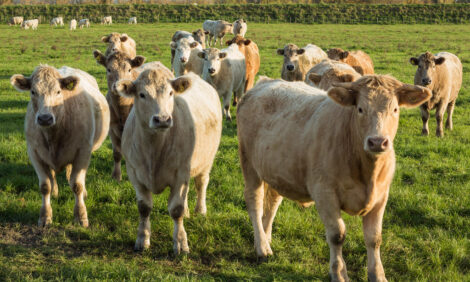



Green Dream Materialises in UK Dairy
UK - Dairy UK has launched a major drive to raise the environmental profile of the dairy sector, starting with the publication of a booklet on the issue.“Green and White: The environmental credentials of the dairy industry” is a glossy collection of new case studies (see below) from the farming, processing and retail sectors of the dairy chain, showcasing some of the many projects under way to make milk ‘greener’.
Launching Green and White, Jim Begg, Director General of Dairy UK, said: “As our industry embarks on an ambitious new programme of environmental improvements courtesy of the Milk Roadmap, we realised that there was a need to explain better what we’re doing in this area.
“Everyone’s heard the story about cow ‘emissions’, but not many realise that nutrition experts are trialling a dairy diet that can cut methane emissions by 20% per litre of milk and improve herd health. Similarly, dairy companies have managed to cut their energy use by 16% since the mid-1990s and water use has also fallen dramatically.
“Much of this is technical stuff, but it all adds up to a massive improvement in our industry’s environmental impact. Our commitment through the Milk Roadmap ensures that those improvements will continue to be made for years to come. We want to get that message out to Government, NGOs and through them, to consumers.”
Dairy UK is posting copies of Green and White to MPs, Government ministers, civil servants, European officials and environment lobby groups as part of its awareness raising campaign. At the same time, we have just appointed a new Environment Manager, Fergus McReynolds, to drive our work in this arena, and have enlarged our environment team.
Dairy UK is actively assessing progress towards the Roadmap targets and plans to report back to the Dairy Supply Chain Forum in October. The industry has committed to recycling half of plastic milk bottles back into milk bottles by 2020, as well as a 30% cut in water use, virtually eliminating waste to landfill and generating energy from farm waste.
Begg continued: “Our industry is working hard to lighten the environmental impact of milk. Dairy UK wants to make sure people are aware that this is another reason we’re Proud of Dairy.”
Case Studies
Cows Diets: First Milk tackles methane emissions from cows in Wales by working with animal nutritionists to develop dietary supplements that reduce gas emission and increase milk yields. (First Milk / Keenan Rumans – North Wales)
Nitrogen Fertiliser Use: Asda and Arla Foods are helping their farm producers to cut nitrogen fertiliser use and show that in some cases, reductions in nitrogen fertiliser for grazing fields of up to 33% can be made without affecting milk yields (Brighouse, West Yorkshire)
Renewable Energy: A Scottish farmer is pioneering anaerobic digestion and turns the slurry of 250 cows into enough energy to heat and power his farm, home and processing / bottling plant. (Ayrshire)
Transport Efficiency: BV Dairy in Dorset is switching to cleaner engines throughout their vehicle fleet. The new engines use an exhaust gas recirculation process which significantly reduces CO2 emissions per litre of fuel burnt. At the same time, drivers are being trained to drive more efficiently and satellite tracking is being used to optimise route planning.
Energy Efficiency: After makinhas installed reverse osmosis whey processing equipment, allowing one energy intensive evaporation unit to be decommissioned. (West Wales)
Water Use: Robert Wiseman Dairies has invested in state-of-the-art dairy processing facilities that have cut water use per litre of milk by 16% since 2004. Their Bridgwater site boasts the first on-site effluent treatment plant to use membrane technology, which discharges water of bathing quality. Meanwhile, Milk Link’s Crediton Dairy in Devon has installed a Mitsubishi water control system which has eliminated leaks and reduced energy use by 170kWh.
Zero Waste: Robert Wiseman Dairies is rolling out a waste reduction strategy after pilot projects saw recycling rates rise from 17% to 88% of total waste output. By the end of 2008 Wiseman Dairies expects to be sending zero waste to landfill, alongside Arla Foods and other major processors.
Packaging: Dairy Crest has developed a prototype handle-free bottle which could save up to 5,000 tonnes of packaging waste each year if adopted. The dairy is already supplying Marks and Spencer with milk in high density polyethylene (HDPE) bottles containing 10% recycled plastic.
Milk Link has started supplying cheese in packaging containing 25% recycled material. It has raised the proportion of its packaging that can be recycled by consumers and cut the overall packaging weight on its products.
Refrigeration: Marks and Spencer has taken on the challenge of refrigerating more efficiently across all its chiller cabinets in its shops. Alongside standard night blinds which cut energy use by 70%, the retailer is rolling out new equipment which can reduce power consumption by 5% and is testing more environmentally friendly refrigerants.
TheCattleSite News Desk


